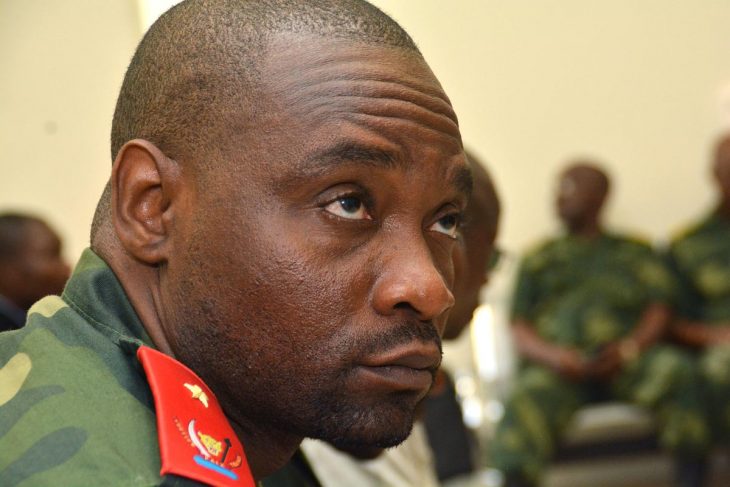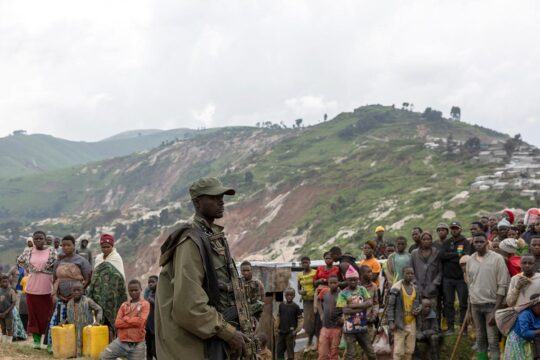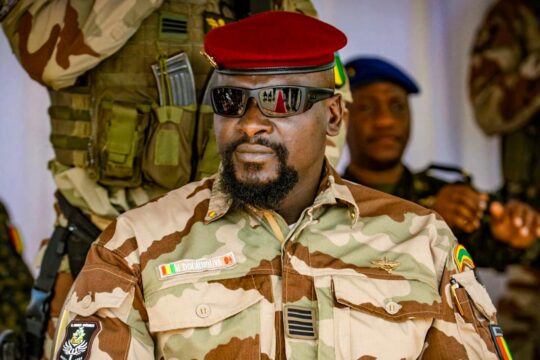Germain Katanga, a former leader in the Patriotic Resistance Front of Ituri (FRPI) militia nicknamed Simba (Lion in Swahili), was tried by the ICC, which sentenced him in March 2014 to 12 years in jail. He was found guilty of war crimes and crimes against humanity for contributing, according to the judgment, to destroying the village of Bogoro in an attack that left some 200 people dead in 2003.
Detained since 2005 in the DRC, transferred to The Hague in October 2007 and sent back to his country in December 2015 to serve the remainder of his sentence, Katanga was due to be released from prison in January 2016, thanks to a reduction in sentence granted by the ICC for good conduct and regrets expressed towards the victims. But the former militia leader, who had joined the ranks of the Congolese regular army in 2004 with the rank of Brigadier General, is still in jail.
“Why is it taking so long?”
Announced with great fanfare, the opening of Germain Katanga's second trial took place on February 3, 2016 before the Military High Court in Kinshasa. However, more than three years later, the military judges have not yet entered into the substance of the case. And the accused and his lawyers are constantly complaining of irregularities and violations of the rights of the defence.
At a hearing on February 16, 2018, Katanga addressed the court to assert his rights. "What stage of the trial are we at? Are we on the merits of the case or are we still in the preliminaries?" he asked, standing upright in his Congolese Armed Forces uniform, pinned with general's ribbons. "Why is it taking so long?" he asked. "Let's move forward."
The defence therefore requested provisional release. But this request was rejected on April 25. The judges justified their decision by the seriousness of the allegations and the fact that the accused has no known residence in Kinshasa. On June 6, at a new hearing, defence lawyer Peter Ngomo Milambo tried again with evidence that Ituri MPs were ready to host Katanga in the event of provisional release. But this was to no avail.
“This trial is political”
Interviewed by JusticeInfo at the end of the hearing, the lawyer says there are "political motivations". "It is incomprehensible that our client has spent more or less 15 years in detention," he said. "It is a first in the history of our country that a detainee is kept for 15 years before being brought before a judge and is denied provisional release on the pretext that he has no residence in Kinshasa. There is bad faith and hatred on the part of those leading the case."
When the trial began in February 2016, the Court noted that no one had filed as civil parties against Katanga. "This shows that the authorities are not yet ready to open this trial," Junior Safari of the Congolese Association for the Respect of Human Rights told AFP at the time. "They rushed the action to nail Katanga, so that he would not return to his stronghold," said the activist, whose NGO is based in Ituri, a gold-rich region in northeast DRC. Even if the former rebel has no stated political ambitions, he remains a popular figure and an influential person within the Lendu community.
Ituri civil society president Jean-Bosco Lalo says Katanga is a victim of injustice. "To pursue Katanga again in the DRC after the ICC prosecutions is judicial harassment, it's unfair. We believe that Katanga has already paid for his mistakes and crimes," he told JusticeInfo. "This trial is political, it's politically charged. We don't understand why we have to prosecute someone who served ten years [in prison] in The Hague." Lalo denounced "discrimination in the treatment of all Ituri cases".
Concerns
In Kinshasa, Germain Katanga is being prosecuted with Floribert Njabu, Sharif Manda and Pierre-Célestin Mbodina, who testified for his defence during the ICC trial. As soon as the trial was announced, Human Rights Watch (HRW) called in a statement on December 23, 2015, for Katanga and his three co-accused to be ensured a "fair and speedy trial". The ICC trial against Katanga uncovered evidence “about the role of high-ranking military and political officials in Congo and Uganda in providing strategic direction, and financial and military support to the FRPI and other militias during the Ituri conflict in 2002 and 2003,” HRW said, adding that at least one of the three co-accused "testified about President Joseph Kabila’s role in backing rebel forces at the time of the Ituri conflict”. The NGO warned that national proceedings against those who revealed information at the ICC might turn into “a trial based on political vengeance”.
As if to address these concerns, Major General Timothée Mukuntu, who leads the prosecutor's team in this case, stated at the hearing on May 7, 2016: "We are not prosecuting General Katanga on politically motivated charges [but] for serious crimes committed in Ituri between 2002 and 2006, other than those for which he was convicted by the ICC." Katanga is being prosecuted notably for his alleged role in the killing of nine Bangladeshi peacekeepers in 2005 in Ituri.
Back to the ICC
The ICC presidency at the time authorized the DRC to prosecute Katanga in a decision of April 7, 2016, two months after his trial started at the Court. The ICC was acting for the first time under Article 108 of the Statute of Rome, which says that a State holding a person sentenced by the ICC must ask the Court’s permission if it wants to prosecute him or her for “any conduct engaged in prior to that person's delivery to the State of enforcement”.
Katanga’s former lawyer at the ICC David Hooper of Britain has now decided to take up the case again. In a request of January 30, 2019, he called on the ICC Presidency to reconsider its authorization for the DRC to prosecute. “Despite the subsequent lengthy passage of time there has been absolutely no progress in that prosecution” says the request. “No reasonable Presidency would have given its approval to the DRC to prosecute had it known the consequences of the decision.” Hooper also says “the distinct impression is that the DRC is unable or unwilling to progress the case against him, preferring to leave him in custody without trial”.
So Katanga’s legal battle is now being fought on two fronts. And this Congolese case – one of the only three convictions handed down by the ICC so far – has returned to haunt the ICC.






